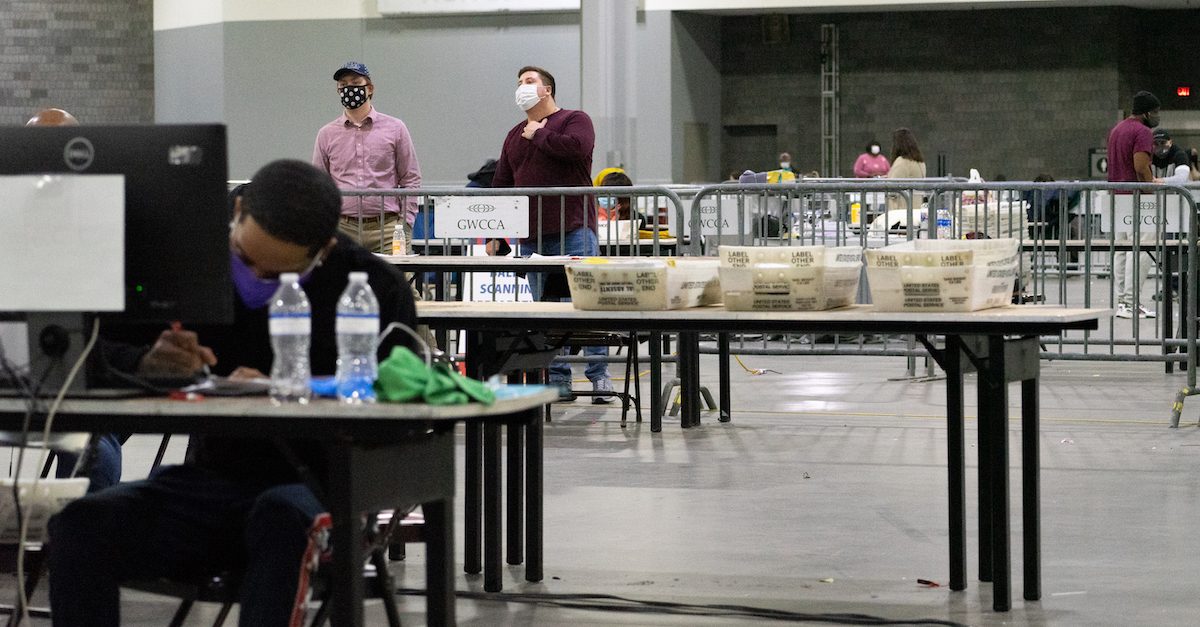
Observers look on while election officials count the votes for Fulton County on January 6, 2021 in Atlanta, Georgia.
One of the lawyers believed to be behind the effort to send a slate of “false electors” to Washington, D.C., to certify the results of the 2020 presidential election says that the subpoena from a Georgia district attorney investigating the matter would require him to violate his client’s confidentiality.
Kenneth Chesebro, the New York-based lawyer who is alleged to have concocted the plan to convene a slate of electors who would have voted for Trump, filed a motion to quash a subpoena from Fulton County District Attorney Fani Willis (D) on Thursday. Emails have shown that Chesebro communicated with John Eastman ahead of Jan. 6 about a legal memo he had drafted, strategizing about what could take place that day.
A special purpose grand jury was convened as part of Willis’ investigation into alleged efforts to overturn the vote count in the 2020 presidential election, when the Peach State went for Joe Biden over Donald Trump, the first time a Democratic presidential candidate has won the state since Bill Clinton’s win in 1992.
Chesebro, through attorney Scott Grubman, said that the questions he expects to be asked if he was forced to comply with the subpoena would likely be subject to attorney-client privilege.
“[T]he subpoena issued to Mr. Chesebro relates to the DA’s ongoing investigation of former President Donald Trump and others for alleged interference in the 2020 election, and the testimony that the DA will seek to elicit from Mr. Chesebro relates to his prior representation of the Donald J. Trump for President campaign,” Chesebro’s motion says. “Accordingly, any testimony from Mr. Chesebro would necessarily relate to Mr. Chesebro’s representation of a former client — the Trump campaign — a fact that is directly relevant to [Chesebro’s legal argument].”
Chesebro said that without knowing what questions the DA’s office will ask, he “cannot address this issue fully,” and asked for a hearing “where the DA will be required to identify their planned areas of inquiry so that the parties can litigate this issue before Mr. Chesebro’s grand jury appearance.”
Chesebro also argued that he is bound by a duty of confidentiality to his onetime client.
Citing the New York Rules of Professional Conduct (NYRPC), Chesebro says that the duty of confidentiality “is, in many ways, broader than the attorney-client privilege.”
According to a comment on NYRPC 1.6, Chesebro says, the duty of confidentiality “applies not only to matters communicated in confidence by the client, which are protected by the attorney-client privilege, but also to all information gained during and relating the representation, whatever its source [sic] [emphasis in original].”
“Given the broad definition of ‘confidential information’ subject to [the rule], it is likely that any question that the that the DA’s office would want to ask Mr. Chesebro during his grand jury appearance would fall within the confines of Rule 1.6, thereby prohibiting from Mr. Chesebro from answering, regardless of whether attorney-client privilege applies,” the motion argues.
One top legal ethics expert says that Chesebro’s motion is misguided, however.
“Chesebro’s motion misunderstands the law in two ways,” New York University professor and legal ethicist Stephen Gillers told Law&Crime. “First, the fact that some grand jury questions may ask for privileged information, if true, would not be a basis to refuse to appear at the grand jury. Chesebro’s obligation is to appear and if he believes a question seeks privileged information, he can assert the privilege. A judge then decides if he’s right. In other words, the privilege allows him to refuse to answer certain questions. It does not allow him to refuse to show up.”
“Second, Chesebro’s reliance on a lawyer’s duty of confidentiality is not a basis to refuse to appear or even a basis to refuse to answer a question,” Gillers continued. “The duty of confidentiality does not defeat a subpoena or limit the questions a grand jury can ask. A lawyer’s confidentiality duty tells lawyers that they must respect a client’s confidences and not reveal them, but a subpoena can force them to do so. The duty of confidentiality binds lawyers only. It does not apply in a grand jury.”
Chesebro is the third high-level Trump ally to file a motion to quash a subpoena stemming from Willis’ investigation. Sen. Lindsey Graham (R-S.C.) was ordered by a district judge to comply with the subpoena, but the 11th U.S. Circuit Court of Appeals recently stayed his compliance in order to allow him to further argue that the subpoena is unconstitutional. Graham is alleged to have made phone calls to Georgia Secretary of State Brad Raffensperger (R) at around the same time Trump had also asked the state’s top election official to “find” enough votes to overturn Biden’s victory.
Georgia Gov. Brian Kemp (R) also filed a motion to quash a subpoena from Willis, and accused the DA of having “improper political motives” in issuing the subpoena.
Read Chesebro’s filing, via Politico, below.
[Image via Megan Varner/Getty Images.]
Have a tip we should know? [email protected]